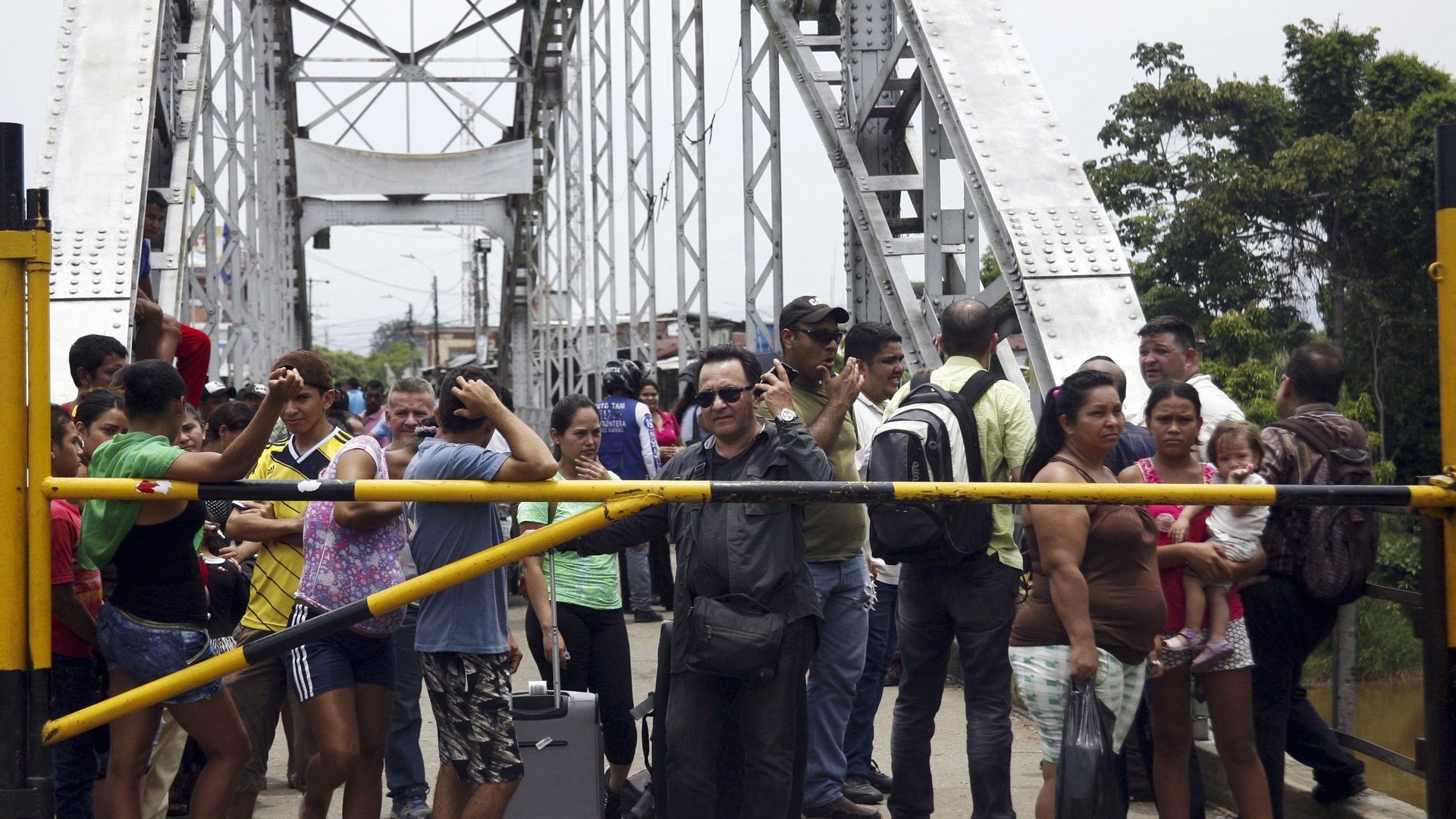After deporting 1,400 Colombians, Venezuela pledges to take 20,000 Syrian refugees
On Sep. 8, president Nicolas Maduro announced that Venezuela is prepared to receive 20,000 Syrian refugees fleeing conflict in the Middle East. “I want 20,000 Syrians, Syrian families, to come to Venezuela and share this land in peace,” he told his council of ministers, according to the Associated Press.


On Sep. 8, president Nicolas Maduro announced that Venezuela is prepared to receive 20,000 Syrian refugees fleeing conflict in the Middle East. “I want 20,000 Syrians, Syrian families, to come to Venezuela and share this land in peace,” he told his council of ministers, according to the Associated Press.
The announcement comes on the heels of an Aug. 19 executive order, with which Maduro closed the border between Venezuela and neighboring Colombia, and dispatched both police and National Guard troops to deport 1,400 Colombians living on the Venezuelan side.
“Colombia’s decades-long internal conflict between paramilitaries, guerrilla groups and the Colombian army has displaced massive numbers of people, with at least 4.1 million people forced from their homes, both within and across its borders, since 1985,” Refugees International reports. Thousands fled to Venezuela during those years, where they have been living in relative peace for three decades.
The crisis sparked anew in early Aug. 2015, when unknown gunmen shot and wounded three Venezuelan border-police officers—agents reportedly looking for smugglers who buy cheap, government-subsidized goods in Venezuela and resell them at a profit in Colombia. “President Maduro claims Colombian smuggling rings are part of a larger ‘economic war’ that is being waged against his socialist government and is creating the food shortages,” Time’s John Otis reports.
Anti-Colombian xenophobia has seen a sharp rise in Venezuelan frontier provinces as a result. In addition to official deportations, more than 17,000 Colombians living in Venezuela have fled. “With the normal land crossings sealed, many returnees have opted to wade across the knee-deep Táchira River that forms the border, carrying children, duffle bags, sofas and refrigerators,” Otis adds. The United Nations resident coordinator for Colombia, Fabrizio Hochschild, has declared the situation a “humanitarian emergency” (link in Spanish).
Both Caracas and Bogotá have withdrawn their respective ambassadors.
Maduro claims the continuing deportation process will be carried out with special regards to the human rights of Venezuelan-based Colombians. Colombian president Juan Manuel Santos disagrees: “Flattening houses, using force against people, separating families, not allowing them to take their few possessions and marking the houses for demolition is totally unacceptable and is a reminder of bitter episodes of humanity that can not be repeated,” he told reporters on Aug. 25, according to Reuters.
Venezuela’s delegate to the United Nations, Rafael Ramírez, defended the crackdown on Sep. 8, telling reporters that Maduro’s decision was a legitimate response to the illicit trafficking of domestic fuel by “increasingly brazen” Colombian smugglers and “acquiescence” by Colombia’s government, according to The New York Times. Allegedly, smugglers have been sending 100,000 barrels of Venezuelan gasoline and diesel fuel over the border every day, and selling at “an enormous profit.”
Santos has since confirmed that he will hold a meeting with Maduro to discuss the border crisis, though observers are skeptical of its prospects. “While to-way negotiations are unlikely to solve the impasse, Colombia still has options,” writes María Teresa Romero, a professor at the Central University of Venezuela, for PanAm Post. “Besides the United Nations, Santos plans to go to the Inter-American Commission on Human Rights and the International Organization for Migration. He also has promised to file a formal complaint against Maduro himself at the International Criminal Court, where crimes against humanity are not subject to a statute of limitations.”
Meanwhile, on the Colombian side of the border, officials will grant citizenship to dozens of Venezuelans separated from Colombian-born loved ones and family members as a result of Maduro’s crackdown. Colombian foreign minister Maria Angela Holguin confirmed that 158 Venezuelans would be permitted to come to Colombia to reunite with deportees and refugees, according to The Washington Post.
“The most incredible thing is that now, in the 21st century, people come to you crying because their children are Venezuelan and they think they’re going to be taken away,” Holguin told fellow cabinet members in a meeting held Sep. 1 in the border city of Cucuta, where, according to the Post, “more than 2,000 people are receiving assistance in emergency shelters.”
Political intricacies aside, it certainly raises questions about the Maduro administration’s ability to provide adequate care for more 20,000 Syrian refugees. With nearly as many Colombians inadvertently displaced as a result of government action against reported criminals, the outlook is hardly favorable.